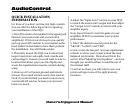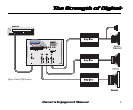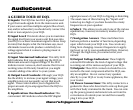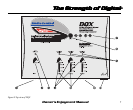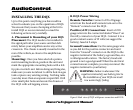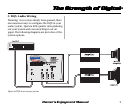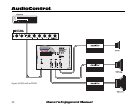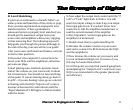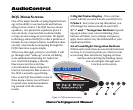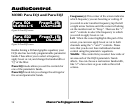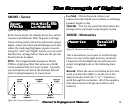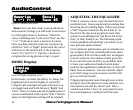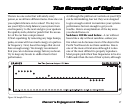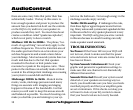
Owner’s Enjoyment Manual
The SThe S
The SThe S
The S
trtr
trtr
tr
engtengt
engtengt
engt
h of Digith of Digit
h of Digith of Digit
h of Digit
alal
alal
al
™™
™™
™
11
D. Level Matching
If you have ever listened to a friend’s “killer” car
audio system and heard lots of hiss, clicks or pops,
then you have experienced an improperly level
matched system. When a performance
autosound system is properly level matched, you
should get the maximum output from your
source unit and amplifiers without any clipping
or that annoying hiss! The following steps will
help guide you through the process, although at
the end of the day, your ears will be your guide!
1) Set your source unit’s fader and balance controls
to their center positions.
2) Disconnect the output RCA connections be-
tween your DQX and the amplifier(s)...otherwise
get some ear plugs.
3) Start playing some relatively dynamic music
and set the volume on your source unit to about
3/4 of maximum. You should not hear anything
at this point. If you are hearing music, go back to
step #2 … if you are hearing voices, go see a doctor!
4) Starting with the DQX “Input Level” control,
increase or decrease the control knob until the
“Input Maximized” LED begins to flicker steadily
with the music.
5) Now adjust the output level control until the “2
volt” or “5 volt” light starts to flicker. You will
want the output voltage to match up your ampli-
fiers input gain levels. If you don’t know how
much this is, ASK the amplifier manufacturer or
read the owner’s manual of the amplifier.
6) Very Important - Set the input gains on the
amplifier(s) at minimum!
7) Double check that you performed Step #6
8) Decrease the volume control on your source
unit and re-connect the RCA’s between the DQX
and the amplifier(s).
9) Now increase the volume on your source unit
to your normal listening level. For some of you,
this may be louder than others!
10) At this point you may find yourself going back
and adjusting the “Output Level” controls on your
DQX to accommodate for the speaker placement
and efficiency.




